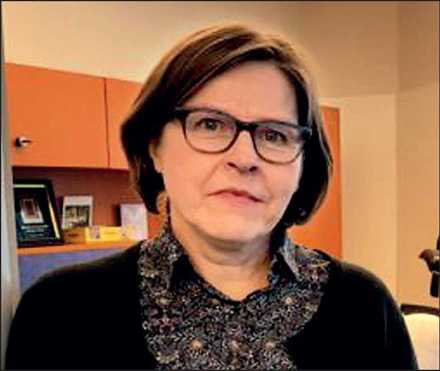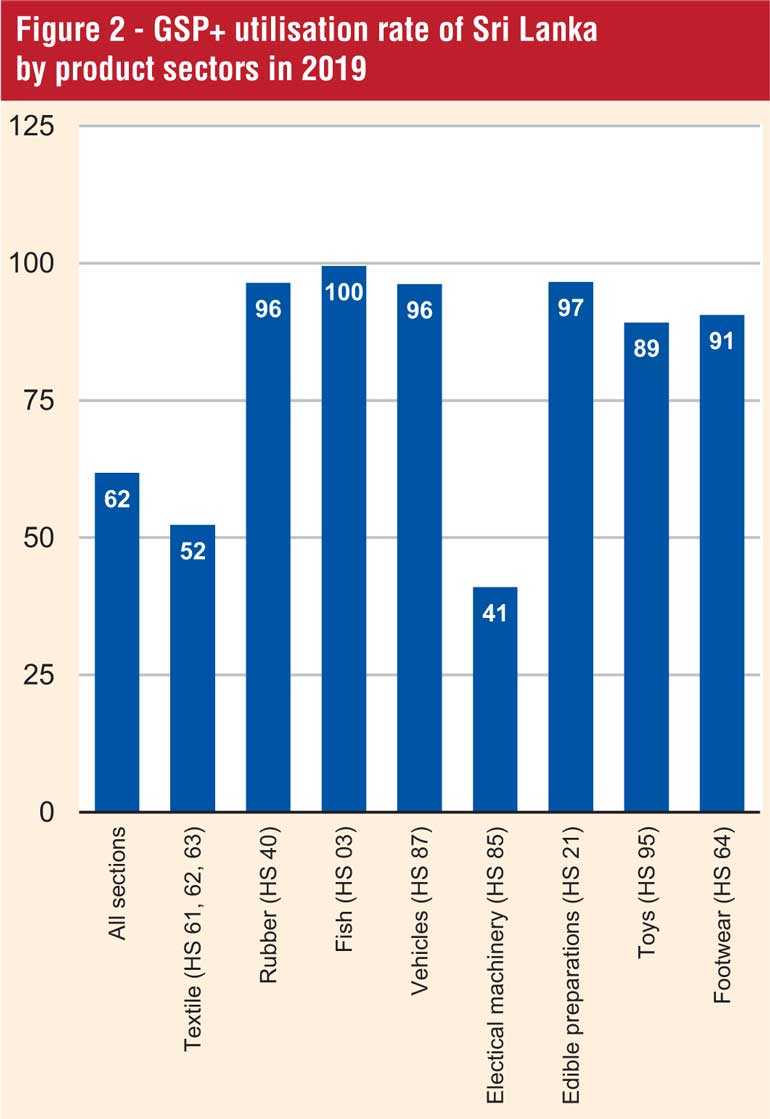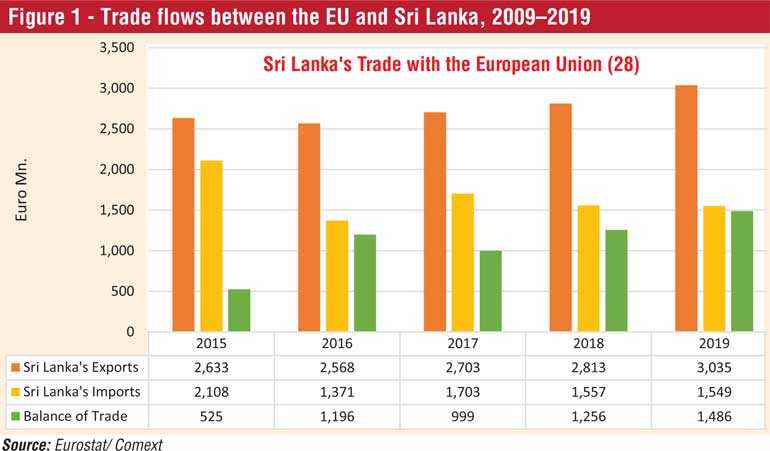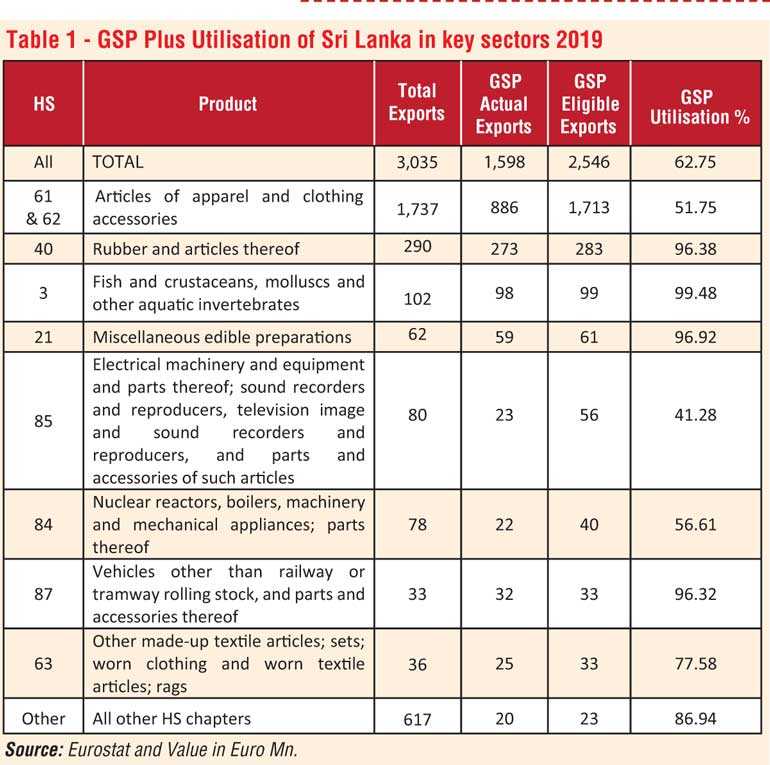Saturday Feb 14, 2026
Saturday Feb 14, 2026
Wednesday, 28 April 2021 00:00 - - {{hitsCtrl.values.hits}}

Sri Lanka’s Ambassador to the European Union Grace Asirwatham

Member of European Parliament Heidi Hautala, from Finland
 During the week of 22-25 March, the GSP Hub which is a European Union (EU) funded project launched in 2020 hosted an important virtual engagement relating to the EU’s Generalised Scheme of
During the week of 22-25 March, the GSP Hub which is a European Union (EU) funded project launched in 2020 hosted an important virtual engagement relating to the EU’s Generalised Scheme of
Preferences (GSP) to increase awareness, transparency, and to engage with stakeholders of GSP.
The objective of this brief article is to present the key issues discussed at this virtual Engagement Week, as most of which are of contemporary importance for Sri Lanka being a beneficiary country of EU GSP scheme. The virtual GSP Engagement was attended by representatives of the European Commission, civil society, academia, industry and trade associations, as well as EU and beneficiary countries.
The conference provided a platform for interaction between the economic rationale and the perspective of the value of the Generalised Scheme of Preferences (GSP) and focussed on how the GSP can help economic diversification, what kind of opportunities it presents for EU producers, and how civil and environmental targets can be achieved in beneficiary countries.
The GSP hub plays a vital role in engaging stakeholders to increase the use of GSP, through bringing new EU investment, encouraging European companies to import from the beneficiary countries and promoting the related international sustainability standards. The GSP Hub maintains a website to facilitate the understanding of the GSP, its activities, and associated important topics, including specifics related to the EU’s GSP and a tailor-made monitoring database for facilitating the dissemination of information and building of an active feedback mechanism for stakeholders.
The virtual Engagement Week had five Webinar sessions focusing on the topics of the GSP and Export Diversification, the GSP and Green Economy, the GSP and Labour Rights, the GSP and Inclusive Growth, and the way forward on the trade policy review and the review of the GSP Regulation. The webinar sessions were organised with expert inputs followed by panel discussions.
The Vice President of the European Parliament, who is a Member of European Parliament (MEP) from Finland Heidi Hautala, inaugurated the GSP Engagement Week with a keynote address. She explained the object and purpose of the GSP and the need to further improve the scheme to be more effective in terms of helping the beneficiary countries. At this inaugural session Sri Lanka’s Ambassador to the European Union Grace Asirwatham participated as one of the panellists who contributed very pertinent and useful inputs to the discussion presenting the perspectives of Sri Lanka on a number of issues.
First, Ambassador Asirwatham explained the policy initiatives and measures taken by Sri Lanka to achieve greater diversification and measures that the EU should take to facilitate diversification of the export portfolio of beneficiary countries, including Sri Lanka.
Second, in her intervention, the Ambassador covered a full spectrum of activities and issues related to Sri Lanka as a GSP beneficiary country. A summary of salient points shared at the Conference is given below;
Third, focusing on the recent policy initiatives and program measures taken to promote exports and export diversification in Sri Lanka, the Ambassador encapsulated the following;
Fourth, responding to the question on any measures that the EU should take to facilitate diversification of the export portfolio of beneficiary countries, including Sri Lanka, the Ambassador highlighted the following points:
The most important one was the strict Rules of Origin criteria. For product diversification especially for manufacturing most GSP recipient countries including Sri Lanka had to depend on other countries for raw material and accessories. For textile and garments, the double transformation rule applies, that is, products must undergo two transformations in Sri Lanka to be able to meet the rules of origin criteria – from cotton to fabric, and from fabric to textile. Since Sri Lanka imports most of its textile from other countries for manufacturing apparel items for export to the EU, it has been an impediment to meet the rules of origin requirements.
The EU Regulation on the Rules of Origin (ROO) provided for cumulation arrangements such as Bilateral Cumulation, Regional Cumulation, Cross-Regional Cumulation, and Extended Cumulation. Cumulation rules of origin criteria allow Sri Lanka to claim originating status for components that do not originate in Sri Lanka but are used in the production process in Sri Lanka. Cumulation is possible with materials originating in countries that are part of Sri Lanka’s regional group: Bangladesh, Bhutan, India, Maldives, Nepal and Pakistan. Cumulation rules also apply between two regions such as SAARC AND ASEAN etc. It can also take place, under certain conditions, with materials originating in countries that have a free trade agreement with the EU. Finally, cumulation is possible with materials originating in the EU.
However, the approval procedure related to Cross Regional Cumulation was rather time-consuming or not given. Due to this reason, the exports with raw materials or accessories originating in other countries do not qualify for GSP plus tariff concessions. Further in the South Asian region, as countries are competing with each other, getting an Origin certificate for raw materials or accessories from those countries is also difficult to qualify under regional cumulation. In this regard a case in point is the joint request submitted by Sri Lanka and Indonesia seeking approval under cross regional cumulation for raw material originating in Indonesia, which has been pending with the EU for nearly three years. Sri Lanka is also expected to submit a request for extended cumulation with Vietnam, against the backdrop of Vietnam’s recently signed free trade agreement with the European Union. To assist exporters from Sri Lanka, the EU GSP Plus guide prepared by the ITC (and available in Sinhala, Tamil and English) provides detailed insight into the requirements and regulations to be complied with in order to access the EU market under the GSP+ scheme.
 Responding to a question on Sri Lanka adapting to green practices, the Ambassador very eloquently stated that Sri Lanka was one of the world’s most ethical sourcing destinations, particularly for apparel. Sri Lanka’s motto on apparel was ‘Garments without Guilt’. Sri Lanka has strong potential to enhance its external trade performance since her brands were increasingly associated with high quality and ethical manufacturing practices, focusing on Green concept, environmental safeguards and practices, and targeting zero child labour through pioneering ‘Child Labour Free Zones’.
Responding to a question on Sri Lanka adapting to green practices, the Ambassador very eloquently stated that Sri Lanka was one of the world’s most ethical sourcing destinations, particularly for apparel. Sri Lanka’s motto on apparel was ‘Garments without Guilt’. Sri Lanka has strong potential to enhance its external trade performance since her brands were increasingly associated with high quality and ethical manufacturing practices, focusing on Green concept, environmental safeguards and practices, and targeting zero child labour through pioneering ‘Child Labour Free Zones’.
Further, Sri Lanka was building an environmentally friendly fabrics zone, pushing for more green energy and better waste management. Sri Lanka wanted to ensure all companies operating in free zones to take advantage of green credentials when selling overseas. Sri Lanka also engaged in promoting exports of organic and fair trade exports. The Ambassador further said that Sri Lanka would like to join the campaign of the EU to make the GSP green for which necessary support by way of capacity building and resources from the EU is required.
Further, Ambassador Asirwatham also took the opportunity to comment on the GDP per capita-based graduation criteria pertaining withdrawal of GSP benefits. As per the current GSP rules, one of the GSP Plus eligibility criteria was to remain at a lower-middle-income level and upon graduating to upper-middle-income status and after maintaining the new income level for three consecutive years the GSP benefits withdrawal process will be initiated with an additional adaptation time. On this issue, the Ambassador presented a valid opinion that the withdrawal should not be done solely based on GNI figures and the EU should also consider other aspect of economic vulnerabilities and the actual developments on the ground.
As the final point, Ambassador Asirwatham highlighted the fact that the GSP tariff advantages would erode in time to come as the EU was entering into FTAs and other bilateral trade arrangements with larger and emerging economies, especially in the Asian region. This would result in affecting the GSP beneficiary countries by way of additional competition to find market opportunities and investments.
The issues raised and suggestions presented at this engagement were well received and discussed during the virtual conference. Ambassador Grace Asirwatham was the only Ambassador who was engaged as a panellist in the week-long Engagement on GSP by the GSP HUB in Brussels.
Besides the points discussed at virtual conference hosted by the GSB HUB, the following two important developments need attention:
1. Brexit
Roughly 30% of all Sri Lanka’s GSP+ exports are destined to the United Kingdom (UK). Specifically, based on 2019 statistics, they consist of apparel, textile and footwear; rubber and plastic articles; machinery; and coffee, tea and spices. As of 1 January 2021, exports destined for the UK are no longer covered by the EU GSP scheme; rather, they are covered by the UK’s GSP scheme. Considering that the UK is a major trading partner for Sri Lanka, it would be important to closely monitor developments relevant to the UK’s GSP scheme.
The UK’s current GSP largely mirrors the EU’s GSP scheme: it contains three frameworks, which correspond to the three arrangements in the EU GSP system. Specifically, it includes a Framework for the Least Developed Countries (LDC), which corresponds to the EU’s EBA arrangement; the Enhanced Framework, which corresponds to the EU’s GSP Plus arrangement; and the General Framework, which corresponds to the EU’s Standard GSP scheme. Countries that are GSP Plus beneficiaries under the EU GSP Plus framework automatically qualify to receive preferences under the Enhanced Framework. It must be noted, however, that differences apply with respect to the tariff lines subject to tariff reductions. The UK tariff lines can be accessed online.
2. 2023 expiry of EU GSP regulation
The regulation that governs the current GSP scheme expires on 31 December 2023. Currently, on the basis of an evaluation of the effectiveness of the GSP scheme, discussions are ongoing regarding the future of the EU GSP regulation, with a number of different options and scenarios on the table: a continuation of the scheme as is; a discontinuation of any GSP arrangement; and fine-tuning the existing regulation (https://trade.ec.europa.eu/doclib/docs/2020/february/tradoc_158624.pdf).
The Commission is currently preparing a proposal for the review of the current GSP scheme. This proposal is expected to be adopted by the second quarter of 2021, once approved by the Parliament and Council. It is most likely that a new GSP regulation will be adopted in 2023 that will incorporate various amendments, including updating the list of 27 conventions that must be complied with as a condition to receive GSP Plus preferences, the product graduation threshold, the safeguards mechanism and an examination of the relationship between GSP and EU Free Trade Agreements.

